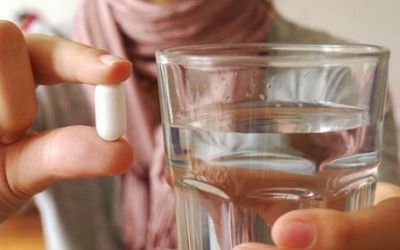- Latest news▼
-
19:41, April 25 Children’s Hospital Los Angeles and International Center of Professional Development Allergy/Immunology Conference

-
17:31, April 25 JAMA: patient grew long, curly eyelashes because of chemotherapy

-
11:08, April 25 Mpox epidemic declared in Republic of the Congo

-
08:31, April 25 OU: quitting smoking 4 times more likely to cure laryngeal cancer

-
01:20, April 25 Paralyzed man in China writes hieroglyphs using neural implants placed in his brain

-
15:11, April 24 Zombie deer disease possibly linked to hunters’ deaths

-
12:27, April 23 Appetite: Scientists found out the secret to the appeal of large portions of fast food

-
10:33, April 23 Scientists test new approach to fighting viruses

-
08:38, April 23 Ketamine may help with postpartum depression

-
22:12, April 22 Unhealthy amount of sugar found in baby food products of a well-known brand

-
19:41, April 22 Air pollution puts health of more than 1.6 billion workers globally at risk

-
17:25, April 22 Scientists found baked goods and lack of sleep to be more dangerous than alcohol

-
16:02, April 22 342 cases of measles recorded in Armenia so far in 2024

-
15:29, April 22 BrainStimulation: electrical brain stimulation alleviates anxiety and depression in the elderly

-
08:27, April 22 Cognitively stimulating jobs in midlife could lower dementia risk in old age, study finds

All materials
Antibiotic resistance can be caused by water chlorination

Chlorine treatment of water may encourage the formation of new, unknown antibiotics that could enter the environment, contributing to antibiotic resistance, scientists have found. Chlorine is used to treat water to kill certain bacteria and other microbes in a process called water chlorination.
According to Healthaim.com, the research was presented at the 249th National Meeting and Exposition of the American Chemical Society wherein discussion on the effects of chlorinated water on health and that it may encourage the formation of brand new antibiotics. A re-evaluation of wastewater treatment and disinfection practices is needed was suggested by the researchers.
“Pharmaceuticals that get out into the environment can harm aquatic life, making them react slowly in the wild and disrupting their hormone systems,” noted Olya Keen, Ph.D. The organisms with increased antibiotic exposure can develop antibiotic-resistant microbes and can weaken an organism’s resistance to bacterial infections, and this includes humans.
“Treated waste water is one of the major sources of pharmaceuticals and antibiotics in the environment. Wastewater treatment facilities were not designed to remove these drugs. The molecules are typically very stable and do not easily biodegraded. Instead, most just pass through the treatment facility and into the aquatic environment,” added Keen.
Keen and her team from the University of North Carolina ran several lab experiments on doxycycline and chlorinated water. They have found that exposing doxycycline to chlorine wastewater increased the antibiotic properties of their samples.
“Surprisingly, we found that the products formed in the lab sample were even stronger antibiotics than doxycycline, the parent and starting compound,” explains Keen. She suggested that the best solution is to decrease the amount of these drugs reaching a treatment plant.
Antibiotic resistance is a grave issue being discussed by experts worldwide. Recently, a new research brought light to the effects of antibiotics use on livestock, that it can cause antibiotic resistance on humans who regularly consumes meat from exposed animals.
Currently, there is no regulation on the disposal of pharmaceuticals. Dr. Keen suggests on collection and incineration of old pharmaceutical products, rather than disposal through the drainage system or throwing these in the trash, which may lead to further health problems.
Follow NEWS.am Medicine on Facebook and Twitter
- Video
- Event calendar
- Children’s Hospital Los Angeles and International Center of Professional Development Allergy/Immunology Conference
- First Armenian-German Conference entitled “Heart Failure Spring School”
- Allogeneic bone marrow transplant in case of hematological malignancy performed in Armenia for first time
All materials
- Archive
- Most read
month
week
day
- JAMA Oncology: Urine test can help rule out high-grade prostate cancer with almost 100% accuracy, study shows 1287
- Scientists grow human mini-lungs in lab 1170
- Next pandemic likely to be triggered by flu - scientists 933
- Scientists found baked goods and lack of sleep to be more dangerous than alcohol 882
- 342 cases of measles recorded in Armenia so far in 2024 840
- Scientists develop new method to safely stimulate immune cells to fight cancer 779
- Blood test can determine who is at risk of developing multiple sclerosis - scientists 778
- Cognitively stimulating jobs in midlife could lower dementia risk in old age, study finds 775
- BrainStimulation: electrical brain stimulation alleviates anxiety and depression in the elderly 717
- Unhealthy amount of sugar found in baby food products of a well-known brand 617
- Ketamine may help with postpartum depression 617
- Air pollution puts health of more than 1.6 billion workers globally at risk 614
- Appetite: Scientists found out the secret to the appeal of large portions of fast food 610
- Scientists test new approach to fighting viruses 595
- Zombie deer disease possibly linked to hunters’ deaths 497
- Find us on Facebook
- Poll





